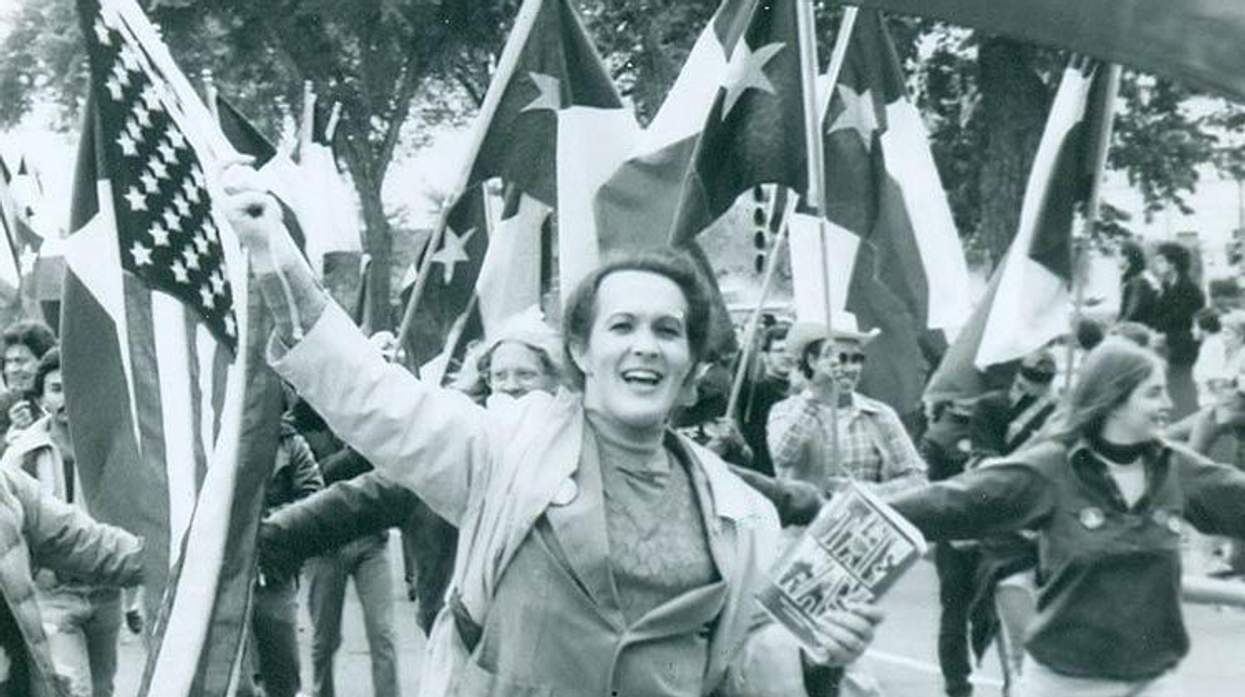As the nation was celebrating its bicentennial, Phyllis Frye, 28, was celebrating becoming a woman. It wasn't easy being out as transgender in 1976, even with a supportive wife. "Three years [into] our marriage she said, 'You are going nuts trying to be the man that you are not. You need to be yourself.'"
Her Texas neighbors weren't as forgiving. They slashed her tires and egged her house. She couldn't get a job, even after getting her law degree. The discrimination turned Frye into an activist. She joined Ray Hill and Lucia Valeska in helping to organize the 1979 March on Washington. Valeska, a feminist who established one of the nation's first women studies programs, had just taken over as a codirector of the National Gay Task Force. (Valeska, who was forced out of NGTF in 1982, died in 2014.)
Frye downplays her role, saying she was just "pissed that transgender was not included at all in any of the publicity."
"Judge Frye is being modest about her role in the march," counters Hill. "Her 'trans advocacy' would give birth to a movement and she used the march organizing as a means of [achieving] that. The state of our collective movement in 1979 was one of uneven development of its component parts. Gay men were not taking the evolution of political potential seriously. The lesbian movement was more politically advanced thanks to the women's music tours and The Ladder. The trans movement did not exist, except for Phyllis's advocacy."
Frye's contributions to the trans movement continued. Among her many accomplishments are the six annual International Conferences on Transgender Law and Employment Policy that she organized, hosted, and provided grassroots training for beginning in 1992. Eventually, Frye established a practice in criminal defense. "By 2010, I had become senior partner of my firm with lawyers who were either LGBT or supportive."
That year, Frye became the first out transgender judge in the entire country, when Mayor Annise Parker picked Frye to be an associate municipal judge for the city of Houston. As an associate she works part-time, which allows her to continue to practice law "and head this firm that I had worked so hard to establish."
A few years ago, when Frye turned 65, she turned daily management of the firm over to her partners. She still goes in a few days a week and still sits on the bench as a traffic court judge. She also still sees transgender clients from around the state who need legal help with name changes and other paperwork. "I do kids as young as 6 and adults in their 70s and all in between," Frye says.
In 2015, Frye was honored with the Julie Johnson Founders Award from the National Center for Transgender Equality. Perhaps even more meaningful? A multipage profile in the nation's newspaper of record the same year.
"I think my legacy is intact. When one is featured on the front page, above the fold of a Sunday edition of The New York Times, where else can they go?" Frye jokes. "But seriously, I hope that the title of being 'grandmother of the national transgender legal and political movement' sticks, because I am that person."
Frye and her wife have now been married 44 years. "Truly, our being best friends is what carried us through some very tough times."
Frye's confident in what she'll leave behind, in part because she planned ahead. She's donated her archive to the Cushing Library at Texas A&M University. "While I plan to live a long time," she says, "my wife knows that if she outlasts me, I want the following on my tombstone: 'She opened doors.'"




































































Charlie Kirk DID say stoning gay people was the 'perfect law' — and these other heinous quotes